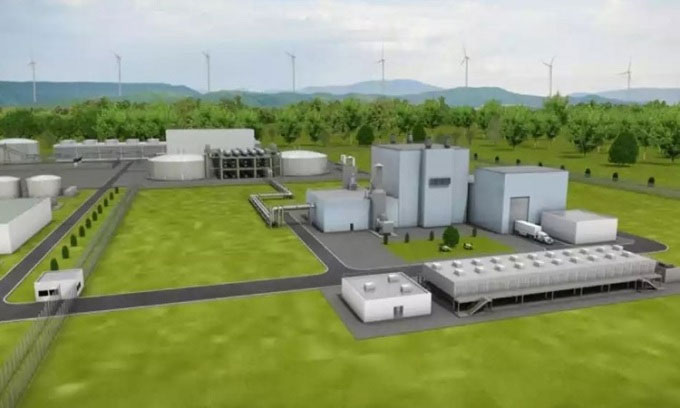The Natrium plant in Kemmerer uses sodium for cooling instead of water, promising to be safer and more cost-effective than conventional nuclear power plants.
A small city in Wyoming will become the site of a test nuclear power plant funded by billionaire Bill Gates. The Natrium nuclear power plant will be located in Kemmerer, replacing a coal-fired power plant expected to close in 2025, according to an announcement on November 16 from local authorities.

Design of the Natrium nuclear power plant. (Photo: TerraPower)
“Our advanced technology will help ensure continuous electricity production while transforming the energy system and creating many jobs in Wyoming,” said Chris Levesque, CEO of TerraPower, the company founded by Gates 15 years ago. Construction is set to begin in 2024.
The city of Kemmerer is located about 210 kilometers northeast of Salt Lake City and is home to 2,600 residents. If reliable like conventional nuclear power plants, the new facility with a capacity of 345 megawatts will generate environmentally friendly electricity sufficient to serve approximately 250,000 households.
Gates, co-founder of Microsoft and chairman of TerraPower, announced plans for the project in Wyoming in June 2021 in collaboration with Rocky Mountain Power. The Natrium plant will utilize sodium-cooled fast reactors and molten salt energy storage. Supporters of the project argue that this type of plant will operate better, be safer, and be more cost-effective than traditional nuclear power plants.
“Natrium will be the next improvement in safety. It is important that the plant does not rely on external power sources, pumps, and other equipment to recover in emergency situations,” Levesque shared.
The excellent thermal conductivity of sodium will allow the Natrium plant to cool using air. The plant can shut down quickly in emergencies. The absence of emergency generators and pumps also helps reduce costs.
However, many experts express skepticism about the advantages of sodium compared to water cooling in traditional power plants. “Using liquid sodium presents many issues. It is a highly volatile substance and can ignite upon contact with air or water,” said Edwin Lyman, director of nuclear safety at the nonprofit Union of Concerned Scientists.
Countries including the United States have tested sodium-cooled fast reactors for decades, but only Russia has developed such a reactor on a large scale capable of producing electricity.

















































